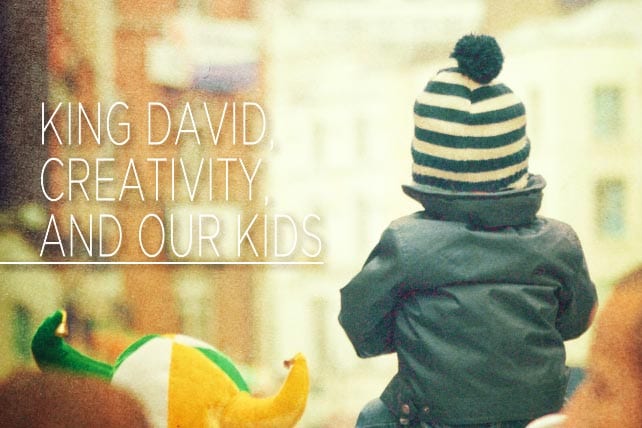As I’ve been thinking about how to talk with kids about creativity – using your imagination to do something unique— I came back to one of the most popular characters in the Bible, David. His life personified creativity, and he often found himself applying those unique approaches to situations he found himself in. Even in the last moments of his life, he reflected on his creative gifts that he used to bring honor to God.
Here are David’s last words. He said,
“I am David, the son of Jesse. God has given me a message.
The Most High God has greatly honored me.
The God of Jacob anointed me as king.
I am Israel’s singer of songs.
“The Spirit of the Lord spoke through me.
I spoke his word with my tongue.”
Despite the fact that David screwed up… a lot…he was one of the few people in the Bible who captioned; described as “a man after God’s heart.” His life—filled with inconsistencies—gives me hope that God can use anyone through any circumstance to change the world.
Most people think of David as a great warrior and king, but we rarely take the time to think about his creative side. Yet, the Bible shows us that he was also a poet, a musician, and even cut a rug on occasion!
One of the most important things we can learn from David’s life is how he harnessed his creativity to work through his emotions. Whether he was scared or joyful, sad or sorry, David prayed through his poems to express to God what was really on his mind.
• He sang joyfully, praising God for who God is and what God had done.
• He cried out in lament, questioning why life was so difficult.
• He confessed the depth of his sin, repented and rejoiced in God’s forgiveness.
All using his creativity.
It’s important for kids to realize that it’s ok to feel angry and scared, sad and sorry. It’s equally important for kids to learn they can process those difficult emotions creatively in a safe place. David’s story gives us the opportunity to talk with our kids about how they can also employ their creativity to help them deal with what happens in life. Like David, they can have hope knowing that even through the tensions of life, they can believe that God will remain faithful and never stop loving them.
Some of the most amazing art comes out of the most deeply emotional places. David’s Psalms of lament resonate because they come from times when he feared for his life, or a place of brokenness. A band like Colony House would never have been able to write a beautiful, soul-rattling song like “Won’t Give Up” to cry out to God in the hard places had their family not experienced great loss. Artists like Vincent Van Gogh created masterpieces like “The Starry Night” in the midst of their mental illness. So many symphonies, sculptures, novels throughout history have been born from pain.
Great art often comes from processing the tragedies of life. Using your creativity can be a redemptive act that turns a tragic situation into one that fosters healing. David’s entire life is testament to that. Our role as parents is to help our kids figure out how they use how God uniquely created them to process the life that happens around them.
Here’s are a few ways to start using creativity to help your kids process what is happening around them:
Fine Arts: Have blank paper on hand for kids to doodle or paint what they’re feeling about a situation they’re facing, or have coloring books around for them to color and find calm when they’re angry or unsettled.
Music: The right song at the right time can turn your whole day around. Help them find a song to sing or listen to when they’re feeling anxious or frustrated. They might pick a sad song, but that’s ok. Sometimes listening to a sad song is perfect for expressing an emotion that kids don’t have words for
Dance: An impromptu 30 second dance party can lift any bad mood in the house. If you’re mad or frustrated, just try dancing to Taylor Swift’s “Shake It Off.” You’ll be smiling in no time!
Sculpture: Have them build with Logos when life feel chaotic and they need structure and for life to fit together, or have them pound on some clay to release some anger.
Writing: Some kids need to process their emotions with a journal. Let them free write on a prompt like “Today, I feel like…” or “When I’m feeling sad, I…” or “The happiest moment ever was…” Pen and paper writing will refocus their brain and allow them to process how they’re feeling.
Think about it: How do you use your creativity to process what happens in your life? And how can you help your kids turn their unique creative bents into avenues for glorifying God in the good times and in the tough ones?













